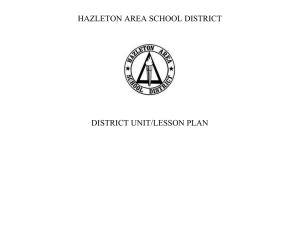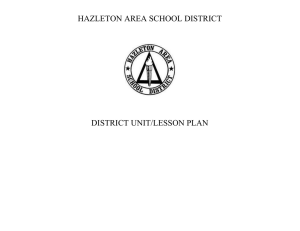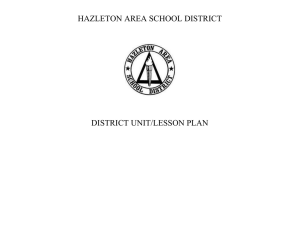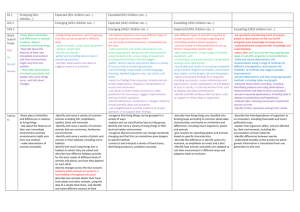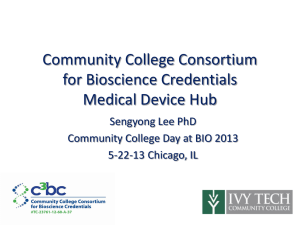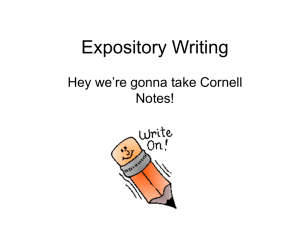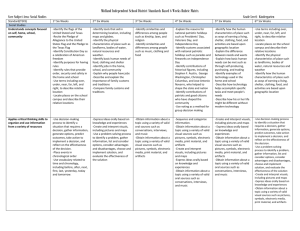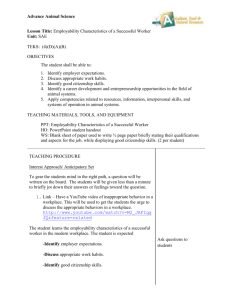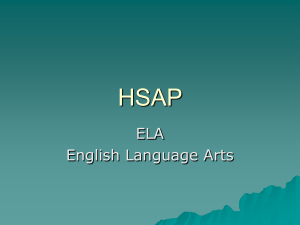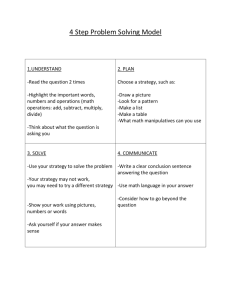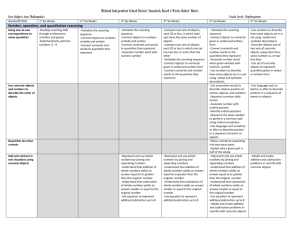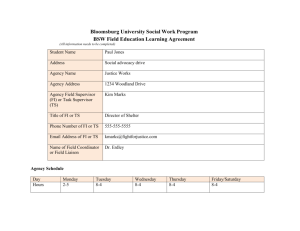Unit 1-Week 3 - Hazleton Area School District
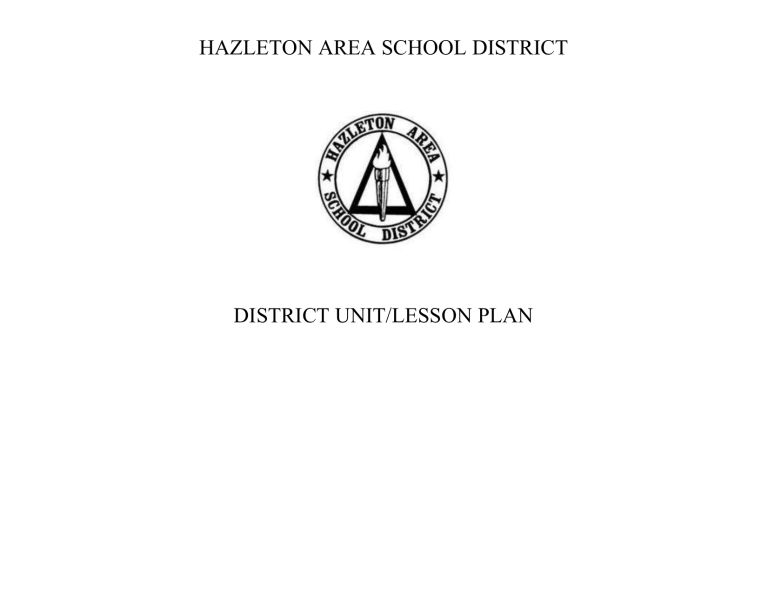
HAZLETON AREA SCHOOL DISTRICT
DISTRICT UNIT/LESSON PLAN
Teacher Name : Danielle Mariano Subject : ELA Start Date(s): 9/15/2014 Grade Level (s): 4
Building : HTEMS
Unit Plan
Unit Title: Clever Ideas
Essential Questions : Where do good ideas come from? How do your actions affect others? How do people respond to natural disasters? How can science help you understand how things work? How can starting a business help others?
Standards:
SL.4.1b, SL.4.2, SL.4.1c, SL.4.1c, RL.4.3, RL.4.1, RL.4.7, RL.4.10, RL.4.5, RL.4.4 RI.4.1, RI.4.5, RI.4.10, RI.4.4, RI.4.7, RI.4.2
RF.4.4b,RF.4.3a
L.4.5c, L.4.1f, L.4.3b, L.4.2d, L.4.4a, L.4.5c, L.4.6, L.4.5b, L.4.1f, L.3.1i, L4.2c, L.3.1h, L.4.4c, L.4.1a, L.4.2c W.4.3a, W.4.3b
Summative Unit Assessment : Theme Unit Test
Summative Assessment Objective
Students will be assessed on their understanding of key instructional content from the focus unit. The results of this assessment will provide a status of current achievement in relation to student progress through the CCSS-aligned curriculum. The results of this assessment can be used to guide instruction, aid in making leveling and grouping decisions, and determine areas in which reteaching or remediation is needed.
Assessment Method (check one)
____ Rubric ___ Checklist ___x_ Unit Test ____ Group
____ Student Self-Assessment
____ Other (explain)
Day Objective (s)
1
2
Student will:
-use grade level academic and domain specific words and phrases
In discussions and sentences
-paraphrase portions of the text
-identify characteristics of a expository text
-write routinely over a shorter time frame for a range of purposes
-spell appropriate words correctly
-demonstrate understanding of vocabulary words by identifying words with similar and opposite meanings.
-orient the reader by establishing a situation and introducing a narrator and/or characters: organize an event sequence that unfolds naturally
1
Student will:
-reread informational text to increase understanding
-identify comparisons and contrasts
-read and comprehend informational (expository) text
-demonstrate understanding of words with a similar but not identical meanings
-use grade level academic and domain specific words and phrases
-write routinely over a shorter time frame for a range of purposes
1
2
DOK
LEVEL
DAILY PLAN
Activities / Teaching Strategies Materials / Resources Assessment of Objective (s)
UNIT ONE WEEK 3
-Build background knowledge on the essential question
“How do people respond to natural disasters?” by showing a video
-complete a web on different types of natural disasters
-learn new vocabulary words by using the vocabulary routine (show the picture of the word, say the word, read the definition, give an example of the word in a sentence, ask a question about the word)
- vocabulary squares (word, synonym, picture and sentence, antonym)
-shared read of the “A World of Change”
-identify characteristics of expository text and record them on a genre chart.
-respond to the prompt: Explain how you can help people who have experienced a natural disaster. Use details with facts and examples.
-repeat spelling words out loud
-circle phonemic patterns in each spelling word
-close reading of “A World of Change”
-think alouds
-completion of practice book pages pertaining to skills being taught
-collaboration and discussion
-add details to a provided prompt
-put spelling words into sentences
-vocabulary squares (word, synonym, picture and sentence, antonym)
W
W
S
McGraw-Hill Interactive “Natural
Disaster” video
-McGraw-Hill A World of Change
-McGraw-Hill Visual Vocabulary
Cards
-McGraw-Hill Grammar Activities
-student journals
-Document camera/projector
-copies of vocabulary squares
-McGraw-Hill spelling and grammar reproducibles.
Formative- Observations, questioning, discussion
Student Self - Assessment-
-Small group review of vocab squares and phonemic patterns of spelling words.
-McGraw Hill A World of
Change
-McGraw-Hill student practice book
-student journals
-document camera and projector
-McGraw-Hill student web program
Formative- Observations, questioning, discussion, PDN
Student Self-Assessment: Reading spelling sentences to group members and to the class
-sharing journal entries
3
4
5
-spell appropriate words correctly
Student will:
-determine the meaning of general academic and domain-specific words and phrases in a text
-use context as a clue to the meaning of a word or phrase
-write routinely over a shorter time frame for a range of purposes
-spell appropriate words correctly
--read and comprehend informational (expository) text
-identify comparisons and contrasts
-orient the reader by establishing a situation and introducing a narrator and/or characters: organize an event sequence that unfolds naturally
Student will:
-spell appropriate words correctly
--read and comprehend informational (expository) text
-identify comparisons and contrasts
-orient the reader by establishing a situation and introducing a narrator and/or characters: organize an event sequence that unfolds naturally
Student will:
-spell appropriate words correctly
-demonstrate understanding of words with a similar but not identical meanings
-use dialogue and description to develop experiences and events or show the responses of characters to situations
-demonstrate understanding of
1
2
1
2
1
2
-completion of an interactive Venn Diagram online
-completion in pairs of a Venn Diagram in the student practice book
-collaboration and discussion
-putting spelling words in a sentences
-revising day one’s journal entry by adding details
-brainstorm ideas for a personal narrative and begin a draft of the narrative
S
W
-McGraw-Hill student practice book
-student journals
-document camera
-McGraw-Hill student web program
Formative- Observations, questioning, discussion, thumbs up/down, PDN
Student Self - Assessment- exit slip, sharing journal with classmates, collaboration with peers when completing a graphic organizer
-shared read of the story “Earthquakes”
-discussion of various You-Tube videos of actual footage of various natural disasters
-completion of practice book activities from student practice book (small group and individual)
-review of vocabulary words using the McGraw Hill online vocabualry
-brainstorm ideas for a personal narrative and begin a draft of the narrative
W
S
McGraw Hill Earthquakes
-McGraw-Hill student practice book
-You tube website
-computer and projector
-student journals
-document camera
-McGraw-Hill student web program
-spelling test
-vocabulary quiz
-review punctuation rules of dialogue
-cut and paste a paragraph without dialogue into journal. Then add dialogue to the passage with assistance from peers and the teacher.
-use web based study island program to complete exercises on multiple meaning words
-study island quiz on multiple meaning words
Formative- Observations, questioning, discussion, thumbs up/down, PDN,
Student Self - Assessment- individual or small group discussion
W
S
Dialogue packet from “Teachers Pay
Teachers”
-McGraw Hill assessments
-student journals
-document camera and projector
-computers with study island program
Formative- Observations, questioning, discussion,
Summative- spelling test, vocabulary quiz, study island quiz
Student Self - Assessment- individual or small group discussion
8
6
7 vocabulary words by identifying words with similar and opposite meanings.
Student will:
-read and comprehend informational (expository) text
-identify comparisons and contrasts
Student will:
--read and comprehend informational (expository) text
-identify comparisons and contrasts
-paraphrase portions of the text
1
2
3
1
2
3
-close read of “Earthquakes”
-collaboration and discussion
-think alouds demonstrating the various skills being taught
-answer the “Respond to Reading” questions at the end of the story “Earthquakes”
-various practice book activities
W
S
McGraw-Hill:
-Earthquakes
-Reader/Writer text book
-reading notebook
-student journals
-comprehension test on Earthquakes
-shared read of Tornado
-paraphrase safety tips for preparing and staying safe during a tornado
-compare and contrast safety suggestions for an earthquake and a tornado
W
S
McGraw-Hill:
-Earthquakes
-Tornado
-comprehension test on
Earthquakes
-reading notebook
Formative- Observations, questioning,
Student Self - Assessment- small group discussion / partner discussion
Formative: Observations, questioning
Summative: Comprehension test
Student self-assessment: sharing of Venn Diagrams and paraphrased safety rules
